
www.fsb.org.uk
FEDERATION OF SMALL BUSINESSES ANNUAL REPORT AND FINANCIAL STATEMENTS 2019-20





WE’RE COMMITTED TO CONTINUING TO DO ALL WE CAN TO SUPPORT SMALL BUSINESSES AND THE SELF-EMPLOYED THROUGH THESE DIFFICULT TIMES.
- FSB National Chairman Mike Cherry OBE #SupportSmallBusinesses
Federation of Small Businesses: Annual Report and Financial Statements 2019-20 2
FSB Member | Rashida Thornewell
FSB Member | Liz Kemp
FSB Member | Paul Rothe & Son
FSB Member | Jenny Garrett
FSB Member | Saira Hussain
fsb.org.uk 3 CONTENTS Foreword from the National Chairman 4 Report from the National Vice Chair, Internal Affairs 5 Report from the National Vice Chair, Policy and Advocacy 6 Chief Executive’s Report 7 Who We Are 9 A Truly United Approach 10 What We Achieved Together 2019-20 11 Back to Business: FSB General Election Manifesto 2019 12 COVID-19: Supporting Small Businesses and the Self-Employed 14 Financial Statements 25 Company Information 26 Group Strategic Report 27 Report of the Directors 30 Report of the Independent Auditors 32 Consolidated Statement of Comprehensive Income 34 Consolidated Balance Sheet 35 Company Balance Sheet 36 Consolidated Statement of Changes in Equity 37 Company Statement of Changes in Equity 37 Consolidated Cash Flow Statement 38 Notes to the Consolidated Cash Flow Statement 39 Notes to the Consolidated Financial Statements 40 If you require this document in an alternative format please email: accessability@fsb.org.uk

This has been a tumultuous year for FSB and its members, including a UK General Election, entering the transition period with the EU, and the devastating impact of the COVID-19 pandemic.
I was delighted to be able to attend FSB’s Volunteer Conference early in 2020. Our network of dedicated volunteers work hard to represent FSB at local, regional and national level supporting members and small businesses across the UK.
As the coronavirus emergency began to develop, being a member of FSB came into its own. The Federation stepped up with a raft of member support, communicated through our ‘COVID-19: Supporting Small Businesses’ campaign.
An extensive online hub was created. Members were offered help with business continuity planning, given details of the various government support schemes, and provided with resources to support mental health and wellbeing, including access to our health line FSB Care, and it was heartening to see everyone coming together, giving support where needed.
FOREWORD FROM THE NATIONAL CHAIRMAN
FSB’s history is rooted in small business owners coming together and supporting one another. During a year of great difficulty, uncertainty and change, that collective effort proved itself more important than ever. It is what FSB was set up to do and has proven so crucial during this time of crisis. “ “
Live Q&A webinars with expert panels were provided to answer an array of questions from members and the wider small business community. At a local and regional level, a huge volume of virtual events were arranged to add to the support available.
FSB led the way in making the needs of small businesses and the self-employed known at the highest levels of government. We successfully lobbied for support schemes including the Coronavirus Job Retention Scheme, the Self-Employed Income Support Scheme, grants, emergency loans and business rates reliefs.
The pandemic did not stop the clock ticking towards the end of the UK’s transition period, and FSB stepped up its calls for a pro-small business deal with the EU. Meanwhile, following intensive FSB campaigning, the Government negotiated its first Small Business Chapter in a new Free Trade Agreement with Japan.
Domestically, the late payments issue became all the more acute as coronavirus wreaked its effect on the economy and cashflow. We continued to push for change both at government level and with the interim Small Business Commissioner.
Mike Cherry OBE National Chairman, Federation of Small Businesses
FSB’s partnership with X-Forces Enterprise stepped up a gear this year. We are encouraging military service leavers to start their own businesses, as well as helping employers to take on service leavers and reservists, who can provide a valuable extra resource. This year, the Government adopted our recommendation for a one-year employer National Insurance holiday for those who take on a service leaver. This tax cut will reduce unemployment, help those who have served our country and unleash their potential. Ren Kapur, our volunteer Armed Forces Champion, has now also set up a regional network of volunteers.
Federation of Small Businesses: Annual Report and Financial Statements 2019-20 4 RETURN TO CONTENTS

In late 2019 FSB launched its new look website which featured campaigning at its core and in February 2020, initially to help prepare members’ resilience, and then in response to the demand for accurate information, FSB launched the Coronavirus COVID-19 online hub, the first of its kind in the UK.
The hub was visited by around 750,000 businesses in the first month after launch and by over one million by the three-month mark; it has continued to be the go-to destination for small businesses requiring trusted advice and guidance. It has included everything from clarity on the latest governments’ announcements, advice on business continuity planning and customer communications to mental and physical health resources and suggestions about how to embrace digital to help businesses survive and thrive.
The FSB Legal Helpline received a record number of calls (150,000) over the latter part of the year as so many business owners had to grapple with the legal implications of the pandemic. It’s important to note that the Legal Helpline has supported FSB members, literally 24/7 throughout the crisis. Just short of 50,000 calls were also answered by FSB’s contact centre.
FSB was also quick to switch to the delivery of virtual events and networking with coverage doubling to over 1,300 online events taking place
REPORT FROM THE NATIONAL VICE CHAIR, INTERNAL AFFAIRS
“
During this extraordinary year FSB has worked tirelessly to be there for not only FSB members, but also the wider small business community.
“
from March to September, benefitting more than 30,000 attendees.
It’s a credit to both staff and volunteers that their flexible approach, hard work and dedication has resulted for the third successive year in the generation of a surplus.
Income from subscriptions and joining fees remains FSB’s most significant source of revenue and has benefitted from strong retention levels, resulting from the group’s ongoing focus on the quality of its offering and service to members.
Administrative expenses reduced slightly in the year as the organisation has continued to ensure cost efficiency within its operations, whilst increasing investment in the development of the business.
FSB’s balance sheet is strong and the group remained cash generative during the year. This positions the organisation well to progress its ambitious business plan.
As COP26 approaches, FSB has reinforced its commitment to a net zero UK by 2050 by championing zero carbon initiatives by members and by leveraging our proposed principles-led approach to Government.
Operationally, we’ve continued to make changes towards realising our ambition of being ‘digital by default’, increasingly becoming a paperless
organisation. For the first-time, this year, we launched a fully digitised version of First Voice magazine as an alternative to the printed edition. We carried out a plastics audit across all offices and took decisive steps to abolish single-use plastic.
We’ve also stopped, or significantly reduced the printing and mailing of documents and other materials, further reducing our carbon footprint. We reduced the number of printers at our offices by 50 per cent, recycling all obsolete technology we are able to, in line with environmental legislation and rules, and data security.
Melanie Ulyatt National Vice Chair, Internal Affairs, Federation of Small Businesses
RETURN TO CONTENTS 5 fsb.org.uk

The 2019-20 year began with FSB securing a high profile at the autumn UK party conferences. These were followed by a gridlocked House of Commons that could not agree a path forward on ‘Brexit’, leading to a surprise, unscheduled UK General Election.
FSB influenced each major party’s manifesto, launching our plan of policy proposals and hosting the only election event that year that saw the three potential new chancellors debating our ideas. A new Conservative Government was victorious; the first significant one-party majority government elected since 2005. Its new mandate included many of FSB’s proposals, not least the expansion of the Employment Allowance for small business, and a pledge for a NICS holiday for employing veterans. Crucially, the election resolved the outstanding fundamental on the UK’s exit from the EU – it would now happen in January 2020.
FSB approached Spring Budget 2020 as the moment to achieve the promises made to us in the election, pressing the UK Government not to postpone or sidestep – and they were duly delivered by the new Chancellor, Rishi Sunak. However, the Budget also became the first support package connected to SARS-CoV-2 (COVID-19); a killer virus that had begun to impact the UK.
REPORT FROM THE NATIONAL VICE CHAIR, POLICY AND ADVOCACY
“
FSB was originally created as the voice of small businesses and the self-employed to those in power. In this tumultuous year, if FSB did not exist, someone would have had to create us.
“
Martin McTague Chairman, Policy & Advocacy, FSB
Throughout, we adopted three principles to fight for COVID-19 financial support schemes for our community – they had to be as generous as possible, help as many small businesses and self-employed as possible, and be as swift as possible. Huge and unprecedented flagship UK-wide schemes we secured included the Coronavirus Job Retention (furlough) Scheme, the Self Employment Income Support Scheme (SEISS), and Emergency Coronavirus Business Interruption Loans (CBILS) and Bounce Back Loans of £50,000. These were backed by deferrals for VAT and self-assessment, extra help in Universal Credit for the self-employed and a rebate to small employers for Statutory Sick Pay. In England, lifeline Small Business Cash Grants of £10,000 and £25,000 were sent backwards through the business rates system, leading to funding equivalents in the devolved nations that FSB Scotland, FSB Wales and FSB Northern Ireland tailored to their small business communities.
Millions were helped, but despite our best efforts, the government chose to deliberately cut out of income support groups such as company directors, the newly self-employed and those who earned over £50,000 or had less than 50 per cent of earnings from self-employment. We campaigned for
these, trying to find new solutions. That quest continues into the financial year 2020-21.
Other areas of policy work continued through the year, often with a COVID-19 focus after March 2020. Policy reports on broadband, late payments, digital trade, business crime and ethnic minority businesses were well received across government, parliament and our community.
Having a UK General Election as well as leaving the European Union would be a lot for any year. However, COVID-19 transformed it. I am proud of FSB’s lobbying efforts from volunteers and staff at UK, national, regional and local level, which secured over £100bn of support going in to the small business and self-employed community that we represent.
In difficult times, FSB has come into its own for our members and the broader community. Our lessons learned will make us even better for the future.
RETURN TO CONTENTS 6 Federation of Small Businesses: Annual Report and Financial Statements 2019-20

The second half of this financial year, as the COVID-19 pandemic swept the world, the resilience of our organisation was tested in ways that none of us would have ever been able to imagine before. In my report of last year (2018-19), I said that our members needed more support than ever. In 2020, that need stepped up several gears, and then some more.
Not only was the immediate survival of the UK’s economy, small business and self-employed community at risk, so too was the health, lives and livelihoods of our members, their employees and customers as well as our staff and loved ones.
Having already developed a robust business continuity plan, the organisation was well equipped to react quickly, adapting to the fastchanging situation and transition into a new working environment seamlessly.
Despite the significant challenges being faced by businesses and organisations everywhere, I felt certain that if our organisation pulled together, worked strategically and imaginatively as a tightknit team, we might just be able to weather the storm.
The resilience and expertise of our staff team enabled us to support our members in a variety of ways, through making sure their voice was heard and acted upon at the highest levels of government and through quickly developing and delivering a public relations and communications strategy and campaign. We created secondto-none social media and national and regional media coverage.
CHIEF EXECUTIVE’S REPORT “ “ CER
None of this would have been possible without the unparalleled dedication, loyalty and huge expertise of FSB’s team of professional staff.
FSB was created over 46 years ago to support small businesses by having a strong voice that would be heard at the very heart of government and that remains so, more than ever today. As a result of our work during this year, our brand has never been so warmly received by its multitude of audiences.
Through the pandemic we built on our work to develop a crucial role in communities and part of our COVID-19 Supporting Small Businesses campaign underlined this, communicating how they were being part of the solution to the national emergency – from switching production lines to make personal protective equipment (PPE) and ventilators, to supporting the vulnerable and key workers in their communities.
A key aspect of the campaign was to facilitate member-to-member support, and we launched a new Facebook group in February which has been a lifeline to many of our members.
We also delivered a huge advertising campaign, part-funded by the generous support of JPMorgan Chase. Through this support, we delivered 1,300 online support events, open to all small businesses and attended by 30,000 people, by the end of September.
We negotiated with the government and the industry body for commercial radio for FSB to advertise on local radio across the UK for the very first time, reaching out in a new way to express support for the small business and self-employed community we represent. With Ocean Outdoor we launched a digital out-of-home (DOOH) PR campaign, lighting up our visual
brand identity and creating ‘buzz’ on screens at prime locations across the UK. We partnered with Mail Metro Media to facilitate its generous offer of more than £5m of free advertising for around 1,600 small businesses.
The commercial impact of the disease on small businesses, the humanimpact on their owners and the fastpaced nature of the emerging policy decisions required our contact centre and field teams to be exemplary in their approach.
With lockdown taking effect, our contact centre not only had to manage a huge volume of calls and enquiries, but do so while staff had to switch to working from home, like so many other businesses. Enhanced communication across the department through new messaging technology was key as we endeavoured to answer complex questions from our members and essentially bridge knowledge gaps between them and government guidance, whilst directing to appropriate support from banks, councils and local support.
Knowledge management excellence was vital given the high volume, short notice and complexity of the government guidance so we engaged a new cutting-edge system and worked with organisations, such as Shopify in Canada, to establish best practice.
We enhanced our call tracking and insight approaches to ensure we were close to the nature of member contacts and fed this directly into central government; vital to policy development.
Continued...
fsb.org.uk 7 RETURN TO CONTENTS
Chief Executive’s Report - continued
We collated case-studies from across the organisation which directly fed into our public affairs teams across the UK, lobbying for further government support. And, we utilised our field teams to engage in person with local authorities and big banks to intervene where they were not delivering the required level of service for our members.
Small businesses need our help more than ever and I’d like to express my personal gratitude to everyone within our staff teams for stepping up, going above and beyond and making FSB not only survive, but thrive, as the best membership organisation for the self-employed and small businesses against the most terrible of odds.
Many in the team have worked tirelessly, strategically and expertly; going far above and beyond what would normally be expected. They have done so with grace, compassion and sensitivity. I feel proud that through the crisis, FSB’s members had the backing of some of the best, dedicated professional expertise in the UK.
Julie Lilley Chief Executive, Federation of Small Businesses
Federation of Small Businesses: Annual Report and Financial Statements 2019-20 8 RETURN TO CONTENTS
WHO WE ARE
Our vision is to help smaller businesses survive through these difficult times and ultimately achieve their ambitions.
Our mission is to be recognised as the most influential and trusted organisation representing the voice of all small businesses, in every region and nation of the UK.
FSB is the UK’s biggest business membership organisation, established in 1974, offering our members a powerful voice which is heard in governments at all levels; vital business services and products and the opportunity to be part of the UK’s biggest and most supportive small business and self-employed community.








The UK’s 5.9 million small businesses and self-employed make up more than 99 per cent of all private sector businesses. They contribute a staggering amount to the UK’s economy as well as being a major source of employment; more than 16 million people are employed by smaller firms.
We work to drive the interests of small businesses and the self-employed

through research and engagement with our members; by effective campaigning and influencing those in power through exceptional public affairs, media and public relations activity.
Providing our members with occasions to be an active part of the FSB community is a priority to us. In addition to taking part in surveys and roundtables, they can join in with
1. 2. 3. 4. OUR CORPORATE OBJECTIVES:
To be fully representative of the whole UK small business community


campaigns and attend FSB events held throughout the year.
Our local and national activism helps shape policy and decisions that have a direct impact on the day to day running of smaller businesses.
We strive to ensure that the range of member benefits we offer are relevant, positive and competitive.
To provide support, advice and practical solutions to our community of members
To advocate on behalf of small businesses and the self-employed, providing a powerful voice heard by governments and key decision makers
To create a financial climate which ensures best value for members and safeguards FSB for the future
RETURN TO CONTENTS 9 fsb.org.uk
A TRULY UNITED APPROACH
As the UK’s largest business group, FSB represents small business owners and self-employed individuals in every sector of the economy and every corner of the country.
FSB has volunteers and dedicated, expert staff right across the UK, who together deliver a strong, respected voice heard at the heart of government – whether in Westminster, Whitehall, Holyrood, Cardiff Bay, Stormont or local government.
FSB UK








RETURN TO CONTENTS Federation of Small Businesses: Annual Report and Financial Statements 2019-20 10
#FSBbacktobusiness BACK FSB GENERAL
FSB Scotland
FSB North East
FSB Yorkshire & The Humber
FSB East Midlands
FSB East of England
FSB London
FSB South East
FSB South Central
FSB South West
FSB Wales
FSB West Midlands
FSB Northern Ireland
FSB North West
Over the last financial year, we campaigned on numerous central issues that affected our members, not least ensuring that as much government support as possible was put in place, as quickly as possible, for as many members as possible affected by the coronavirus (COVID-19) pandemic. At the same time, we created and delivered as many resources and tools to help members with their survival and opportunities for new growth in the midst of a very different world. The focus of the first half of the financial year had been on delivering the Back to Business: FSB’s General Election 2019 Manifesto and related campaign to successfully influence the UK’s political parties to adopt key FSB policy recommendations in their own manifestos.











“At this time of national emergency, small businesses are proving how much they’re at the heart of our communities...”



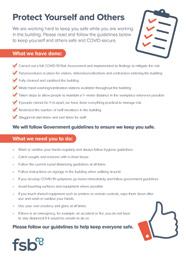


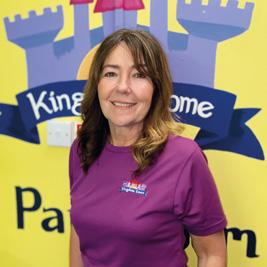



RETURN TO CONTENTS 11 fsb.org.uk WHAT WE ACHIEVED TOGETHER 1 October 2019 - 30 September 2020 2019 - 20 BACK TO BUSINESS GENERAL ELECTION MANIFESTO 2019 Complete a risk assessment of your or your employees return. FSB members can log into the Legal Hub and download Review your opening times or separate shifts to allow regular cleaning to occur and for employees to travel safely transport. Remember, the government is advising those using public transport to Keep your distance Ensure that you’re adhering to the distancing For example, you could place arrows on the floor to mark distances or employees to keep 2 metres away from each other. This includes communal areas an office setting, this may mean taping off desks and suspending hotdesking. operating procedures With the best of intentions, may not be during lifting or manual handling). Use barriers or machinery to help with these buddy working to reduce the number of Wash your hands Ensure that employees can wash their hand washing guide can be printed and displayed in your premises. hand employees have supply of hand sanitiser which is accessible. You may also wish to may have to share equipment there no other alternative. As well as employees social distancing, your customers need to keep their and separate entrance and exit doors. You may need to limit customer numbers and prepared. Alternatively, you could operate a kiosk style system to serve customers at Offer alternative purchase methods If you’re able to, accepting orders over the slots can allow you to trade whilst limiting visits to your shop. If you have social media presence, use this to let your customers know you’re taking to protect everyone. Ensure signs are displayed in your premises to advise COVID-19: Health and safety checklist For the latest news, advice and guidance on coronavirus for small businesses and the self-employed, fsb.org.uk/coronavirus Cut unnecessary red tape new Office of Regulatory Reform. The British Columbia model succeeded in cutting regulatory process requirements by more than its one third target. above the VAT threshold in line with the proposal from the Office of Tax Simplification. Non-VAT registered businesses should not be compulsorily included in the Making Tax Digital programme for the foreseeable future, and the scope of the programme should not be extended evidence collected during this time. There should be no retrospective taxation, such as the loan charge, and no re-opening of closed tax years except where deliberate fraud is detected. Employee of FSB member Kaymet.
#SmallBizBigHeart Employee of FSB member Kaymet.
BACK TO BUSINESS: FSB GENERAL ELECTION MANIFESTO 2019












COMMUNITIES AND INFRASTRUCTURE
LiketheUKpopulation,smallbusinessesandFSBmembersweresplitontheBrexitreferendum Withquestionin2016,withmanyvotingforremainandmanyvotingforleave. twomajorgroupsinourmembership,wehavesinceworkedwithallpoliticalpartiestomake Wesurethesmallbusinessvoiceisheardrespectfullybythoseinpower. nowappealtopoliticians,partiesandpeopleofallperspectivestotreateachotherwithrespect
Backurgentattentioninordertosecurejobs,growthandprosperity.Thatiswhythismanifestoiscalled
OnthequestionofBrexit,wehavefocusedonthepracticalitiesandalwayscomebacktoevidence:
Wecannotseecontinueddelaywithbusinessesinlimboformonthsandyears,notknowing thefutureofourtradingenvironment–smallbusinessconfidencehasnowbeeninnegative territoryforanunprecedentedfivestraightquarters.
schemeandafutureimmigrationsystemthatworkswellforsmallbusinesses.
aremade,includingasaresultofanyBrexitdeal,theGovernmentshouldmanagethisprocessin Asuchawaythatitisassimpleaspossibleforfirmstomanage. transitionmustbelongenoughthatsmallfirmshaveadequatetimetoprepare.Thedatesofany
directions,sothatadditionalcomplexityforsmallbusinessesiskepttoanabsoluteminimum.
There are on average more than 25,000 people in each constituency who work in a small business, 7,000 of whom are self-employed. “

For the last three years, the interminable uncertainty around Brexit has dragged focus, attention and imagination from the task of how to help these small businesses – how to help them survive, to grow, to create more jobs, and to improve our communities.
“ At this General Election, we are asking everyone who is standing for election to the Westminster Parliament to get ‘Back to Business’, and help all of these small businesses to thrive. There are a host of pressing domestic challenges that the next Government must resolve.
Martin McTague, National Vice Chair, Policy and Advocacy, FSB, November 2019
12 RETURN TO CONTENTS 16 BacktoBusiness:FSBGeneralElectionManifesto2019 BREXIT Small businesses and Brexit:
and reasonableness as we debate Brexit. There are challenges and opportunities around Brexit; however there are so many domestic priorities that have been eclipsed as Brexit has dominated our political life. These issues need
to Business.
We have opposed a ‘no-deal’ Brexit, due to the dire consequences that small businesses would face and given many simply do not have the resources to cope or re-orient to new markets in time.
For any Brexit deal to work for small businesses, it must be based on transition, trade and
relationship with the EU as our nearest and biggest trading bloc; ensuring better tradingfromarrangementswithmajorandemergingmarkets;makingsuretheUKisopentoentrepreneurs statusoverseas;protectingsmallbusinessaccesstoskillsthroughimprovementstothesettled
Further detail on these areas are below. TransitionThroughout the EU exit process so far we have been clear that any deal must include a proper transition period so small businesses can prepare in advance for any changes to the rules withwhichtheyhavetocomplywithonaday-to-daybasis.Wedonotbelievemorethanonesetofrule
believe that by working both domestically and internationally, the next UK Government can improve the regulatory environment for small firms. However, where any changes to regulations
transition period should be considered in light of a longer than previously agreed timetable for
proper transition period will enable the UK-EU Joint Committee the time needed to ensure
Back Business: FSB General Election Manifesto 2019
talent–afullsignificanttransitionperiod;asfrictionlesstradeaspossible;maintainingagood
Wechangesforsmallbusinessesisdesirable.
AachievingaBrexitdeal.
bothtradingarrangementsbetweenNorthernIrelandandGreatBritainareasfrictionlessaspossible,in
Drive prosperity across every area of the UK: Where we shop, where we eat and where we work are all parts of what make our individual communities the place we call home. In many places, there are particular challenges which threaten these small businesses, whether on the high street, in our rural or coastal areas, or in towns and villages across the UK. The Government must help small businesses in these areas in particular. The greatest challenges facing our country – including the need to move to a zero-carbon economy and provide good public services – must be faced with the needs, opportunities and challenges facing small businesses firmly in mind. Only by working with small businesses can we meet the common challenges we all face. The next Government should: A future for our high streets Remove barriers to growth in the business rates system, take out more small businesses fromthesystemaltogether,andincreaseandexpandcurrentretailers’supportsoitisonapermanent footing, and make sure this helps the food and drink sector too. Areas with high property values need extra support from increased reliefs, in order for small business in these areas to benefit. Fix the Check Challenge Appeal system for small business rates because it simply does not work for small businesses. If businesses are to have any confidence that their business ratesbillsarefair,thentheymustbeabletochallengeincorrectcalculationsanderrorswithoutfearof penalty and within a system that wants to eradicate errors, not hide them. Commit to the Towns Fund providing investment for Scotland, Wales and Northern Ireland. Increase car parking availability, make sure more spaces are offered free of charge, especially at key times of the year, and increase buses and green modes of transport so more people can easily access the high street. Make sure that the planning system, local banking services and the public realm are attracting people to our town centres. Consider introducing Enterprise Zones into areas that most need support. High quality infrastructure Focus on the local transport system as much as national projects – spending on local roads should be double its current rate and all local transport spending should be ring-fenced. In addition, local roads should be included within the scope of the new roads fund. Ongoing road maintenance, rather than piecemeal funding, should be prioritised to prevent future surface defects becoming potholes. Implement the Williams Review recommendations and support both passenger and rail freight enhancements. Provide funding for better quality public bus services, particularly in our rural Give certainty to long-term infrastructure projects, committing to build the airport capacity; local, regional and high speed rail and energy infrastructure we need. Devolve Air Passenger Duty to Wales to support the development of new international trade and tourism routes. ReversechronicunderinvestmentinrailinfrastructureinWalesbycommittingtotheelectrificationof the South Wales mainline to Swansea and investing in Growth Track 360 in North Wales. Federation of Small Businesses: Annual Report and Financial Statements 2019-20
“
“
fsb.org.uk #FSBbacktobusiness BACK TO BUSINESS FSB GENERAL ELECTION MANIFESTO 2019 Economy Cut unnecessary red tape Cut unnecessary red tape by introducing the British Columbia model of regulatory reform to reduce the number of regulatory process requirements businesses face and introduce a new Office of Regulatory Reform. The British Columbia model succeeded in cutting regulatory process requirements by more than its one third target. Prevent small businesses from being dragged into VAT administration by raising the threshold in line with inflation, introducing a tapered system for phasing in those businesses who are just above the VAT threshold in line with the proposal from the Office of Tax Simplification. Non-VAT registered businesses should not be compulsorily included in the Making Tax Digital programme for the foreseeable future, and the scope of the programme should not be extended to other taxes for at least the next two to three years. Any extension should be on the basis of evidence collected during this time. There should be no retrospective taxation, such as the loan charge, and no re-opening of closed tax years except where deliberate fraud is detected. Employee of FSB member Kaymet.



RETURN TO CONTENTS fsb.org.uk 13 Reduce THE JOBS TAX Make APPRENTICESHIPS WORK Help the self-employed with PENSIONS AND MORTGAGES Reform BUSINESS RATES Get small businesses PAID ON TIME Fair access to broadband and mobile ACROSS THE UK Health and wellbeing at work Introduce a new sick pay rebate for firms supporting their employees through period ill-health. Roll out additional occupational health provision to support the self-employed and small businesses. • Focus on helping the self-employed, small businesses and everyone they employ to look after their mental health. We need to not only tackle stigma, but improve outcomes, services and support for those who are struggling with their mental health, including how it affects people at work. We are working with Heads Together help make that happen. Pensions Helpemployers with auto-enrolment. Thepolicy has been a success in helping move people to save for their retirement. However, it has far proved administratively difficult and costly. We would like the next Government to focus making the scheme as easy as possible for small employers to and to rely proven ‘nudge’ measures rather than cost increases to expand the effectiveness of this scheme. Childcare • Make sure the sector deliver the 30 hours free childcare, and other childcare support, it remains on offer for parents. The cost of providing childcare has increased in many areas, outstripping available funding. • Improvetheusabilityofthechildcareservicewebsiteandthecustomerservicesupportavailable parents and carers to register for childcare entitlements. Back the small childcare businesses that enable more people work; in particularbyproviding support in theformof100%businessrate reliefinEngland, hasalreadybeendonein Scotland and Wales. Veterans Encourage and support more Armed Forces veterans to start their own businesses. We are working with X-Forces Enterprise help make this happen. • Help make sure small employers are benefitting from taking on veterans, by ensuring there is a simplified way of understanding and recognising the equivalence between military skills and civilian qualifications. • Make financial support available for those military service leavers and qualifications to achieve their post-military ambitions. • Introduce financial incentive for in the form of one-year FSB member Emma Heathcote-James, The Little Soap Company. Back Business: FSB General Election Manifesto 2019 SELF-EMPLOYMENT Help more people to start and run their own businesses – and give the self-employed a fair deal: One in seven people in work, work for themselves. We believe this is great for the UK, our economy and our society. Self-employment gives many opportunities for people to have more control over their own lives, and for us all to benefit from the dynamism that this freedom allows. At the same time, the self-employed have always been at the back of the queue when it comes to Governmentpolicy.Withthenumberofself-employedpeoplenowequaltothenumberworkinginthe public sector, it is clear this situation can no longer be justified. The nature of self-employment means solutions that work for employees do not always work for the self-employed. The next Government should set aside time, effort and resource to right this wrong. The next Government should: Aiming for entrepreneurship Set an explicit goal of encouraging more people to start their own business, particularly women and ethnic minority entrepreneurs. Encourage more school pupils and college and university students to consider a career in a small business or to start out on their own through enterprise education and careers guidance. Commit to supporting the Start-Up Loans scheme for the duration of the next parliament, as well as the New Enterprise Allowance, to help people to go from unemployment to being their own boss. Training and support Help the self-employed learn new skills by giving tax relief on training in new skills, such as digital skills, currently only available for employees. Expanddigitaltrainingprogrammes,asFSBhasbeendoingwithourpartnershipswithFacebook and Google. Focus the mid-life MOT on the self-employed. Maternity, paternity and adoption Introduceanadoptionallowancefortheself-employedsotheself-employedhavesupportwhen they adopt as employees do. Uprate the Maternity Allowance offered to the self-employed so it is at least level with the most basic support employees are entitled to through Statutory Maternity Pay. A Paternity Allowance should also be introduced. Make Universal Credit fair for the self-employed Support self-employment as a route into work by extending the start-up period, reflecting the reality that it takes more than one year to start a viable business. Assess the Minimum Income Floor on a quarterly basis, so the system works for those who don’t get paid every month in arrears. 15 and Employee of FSB member Kaymet. Back Business: General Election Manifesto FSB member Rayeesa Asghar-Sandys, Spiced by Rayeesa.
COVID-19: SUPPORTING SMALL BUSINESSES AND THE SELF-EMPLOYED


14 RETURN TO CONTENTS Federation of Small Businesses: Annual Report and Financial Statements 2019-20


Covid-19, with all its complexities and challenges, has quickly brought the necessity and value of ethical and strategic public relations and communications to the fore. I commend FSB’s work in this area. It has been highly visible in its support for its members and in translating complex policy matters with the right tone and messaging.
Alastair McCapra, CEO of the Chartered Institute of Public Relations
At the critical crisis point when the pandemic took off in the UK, FSB’s PRCA Public Affairs Award winning policy and lobbying work came into its own. The team encouraged and influenced the Government to design effective small businesses and the self-employed support. This has helped save swathes of the small business and selfemployed community, right across the UK. I commend FSB as a shining example of how effective external affairs can create significant and meaningful change.
Francis Ingham MPRCA, Director General of the PRCA, the Public Relations and Communications Association
49,500
Contact centre calls answered
45,000
FSB members visited their FSB Legal Hub
147,000
FSB members called their FSB legal adviceline
280,000 downloads from the FSB Legal Hub
RETURN TO CONTENTS 15
COVID-19: SUPPORTING SMALL BUSINESSES AND THE SELF-EMPLOYED

As we face this unprecedented national emergency, small businesses and the self-employed: please be assured we’ve got your back “ “
Income Support for Our work achieved:
employers were able to furlough staff
1.2 million small businesses received Bounce Back Loans
1.3 million VAT payments deferred 500,000 self-employed 2.7 million APPLICATION
900,000
small businesses received cash grants
16 RETURN TO CONTENTS
Federation of Small Businesses: Annual Report and Financial Statements 2019-20

2020
AN EXTRAORDINARY YEAR
In 2020, the Coronavirus (COVID-19) pandemic created an extraordinary new world for us all. Despite its grave consequences which have affected us all, it has demonstrated the power of people coming together to overcome adversity; using imagination, ingenuity and flexibility to contribute to the national effort.
On behalf of the UK’s small business and self-employed community, thank you to all those who have worked tirelessly, sometimes risking their own lives, to help bring us out of this chaos; from our scientists and our National Health Service (NHS) and other health and social care providers; to our teachers; our voluntary sector and all public servants; to our infrastructure workers, including those who work in the transport sector; to our essential retail and other services and to all the individuals who have played their part – no matter how seemingly small.
And to all the businesses – large and small – for playing their parts in this extraordinary demonstration of resilience and solidarity across the UK and the world.
At the peak of the pandemic crisis in 2020, FSB was overwhelmed and touched by the volume of organisations – large and small – that reached out to us wanting to support our members in altruistic ways.
We would like to thank all of these for their generous support, including, but not limited to: The Arch Company; Google; JPMorgan Chase; Mail Metro Media Group; Martin Lewis OBE; Ocean Outdoor; Radiocentre; and UK Active.
We’d also like to thank the many politicians, political advisers and civil servants across the UK who have listened to FSB and helped to make many of our recommendations to help support small businesses and the self-employed a reality, in many cases implementing them in a matter of days or weeks.
RETURN TO CONTENTS 17 fsb.org.uk
COVID-19: FSB MEMBERS HELP WITH THE NATIONAL EMERGENCY

The pandemic has demonstrated, more than ever, the powerful value that the small business and selfemployed sector brings to our communities and to our wider society.
57%
of small firms carried out community roles directly relating to the crisis*
23%
of small businesses assisted key workers by providing PPE, volunteering for the NHS or offering accommodation*
Many of our members and their employees were designated key workers themselves, including many in the health and pharmaceutical, manufacturing, transport and food sectors. It was important for us to support them in every way we could think of, both practically and emotionally.
30%
of all small business owners prioritised and supported their more vulnerable customers*
*FSB, April 2020 19%
offered free home deliveries to their more vulnerable customers*
18 RETURN TO CONTENTS Federation of Small Businesses: Annual Report and Financial Statements 2019-20

“At

As a staff team, FSB quickly adapted to new ways of working in line with the changing situation and scientific and government advice.
Building resilience enabled the team to continue to deliver the best member support, often in new and innovative ways. Our work spaces were made covid-secure. We stepped up our existing mental health and wellbeing resources for the team to access; strengthened our internal communications and strived to deliver incredible HR support.

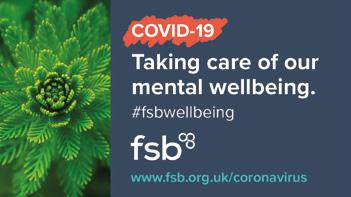
RETURN TO CONTENTS fsb.org.uk
19 Assess the risks Complete a risk assessment of your premises before you reopen for business or your employees return. FSB members can log into the Legal Hub and download a full template for completing your assessment. Review your opening times You may wish to operate on reduced hours or separate shifts to allow regular cleaning to occur and for employees to travel safely to and from work if they have to use public transport. Remember, the government is advising those using public transport to wear a face covering. Keep your distance Ensure that you’re adhering to the government’s guidelines on social distancing. For example, you could place arrows on the floor to mark distances or implement a one-way system to allow employees to keep 2 metres away from each other. This includes communal areas such as toilets, canteens and corridors. In an office setting, this may mean taping off desks and suspending hotdesking. Consider your standard operating procedures With the best of intentions, it may not be possible to socially distance (for example during lifting or manual handling). Use barriers or machinery to help with these tasks where appropriate, and consider buddy working to reduce the number of people working together. The government has released guidance for specific sectors Wash your hands Ensure that employees can wash their hands and are reminded to do so. Our hand washing guide can be printed and displayed in your premises. If hand washing facilities are not available, ensure employees have a supply of hand sanitiser which is accessible. You may also wish to supply wipes for areas where employees may have to share equipment if there is no other alternative. Think about your customers As well as employees social distancing, your customers need to keep their distance. If possible, use a one-way system and separate entrance and exit doors. You may need to limit customer numbers and ask them to wait outside while an order is prepared. Alternatively, you could operate a kiosk style system to serve customers at the door. Offer alternative purchase methods If you’re able to, accepting orders over the phone for delivery or designated pick up slots can allow you to trade whilst limiting visits to your shop. Communicate If you have a social media presence, use this to let your customers know you’re open and advise them of the steps you’re taking to protect everyone. Ensure signs are displayed in your premises to advise people of your social distancing measures. COVID-19: Health and safety checklist For the latest news, advice and guidance on coronavirus for small businesses and the self-employed, visit fsb.org.uk/coronavirus
this time of national emergency, small businesses are proving how much they’re at the heart of our communities...” #SmallBizBigHeart
80% of small businesses actively contribute to their local community #SmallBizBigHeart
FSB member, Creative Nature
COVID-19: SUPPORTING SMALL BUSINESSES AND THE SELF-EMPLOYED

The FSB Coronavirus (COVID-19) web hub launched in February 2020, bringing the most trustworthy and salient advice; guidance; support; resources; useful member benefits and positivity to our members and the wider community.
The hub was the linchpin that public relations activity revolved around and quickly established FSB as the go-to voice of business for national and regional media, allowing us to communicate effectively on behalf of our members to achieve support and credibility as well as providing small businesses with a central ‘lifeline’ in the emergency.

2.3 MILLION VISITS
1.6 MILLION UNIQUE USERS
5.3 MILLION PAGE VIEWS
3.8 MILLION UNIQUE USER PAGE VIEWS

20 RETURN TO CONTENTS Federation of Small Businesses: Annual Report and Financial Statements 2019-20

fsb.org.uk/coronavirus
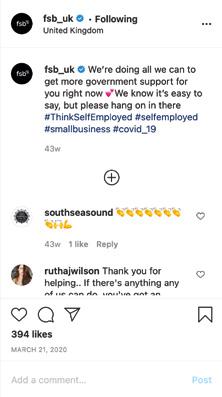
SUPPORT
SMALL BUSINESSES
#SUPPORTSMALLBUSINESSES
#BEPATIENT #BEKIND
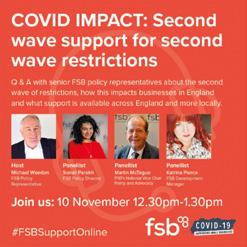

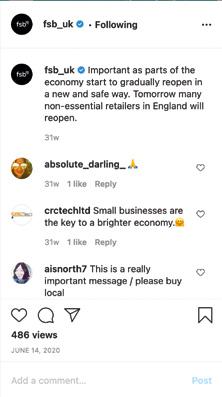

While most have benefitted from direct government support, many haven’t. 1000s of directors and newly self-employed have been left with no help for months now. The Government needs to think carefully about how it will help those who have been left behind.
RETURN TO CONTENTS fsb.org.uk 21
know it’s easy to say, but...
on in there.
We
Self-employed: Please hang
WE’RE
TO CONTINUING TO DO ALL WE CAN TO SUPPORT SMALL BUSINESSES AND THETHROUGHSELF-EMPLOYED THESE DIFFICULT TIMES
COMMITTED
- FSB National Chairman Mike Cherry OBE#SupportSmallBusinesses
COVID-19: THE MEMBERS’ STORIES

Daryl Chambers
InPower Academy
InPower Academy is a community interest company that works with disadvantaged groups from underserved communities in Wolverhampton. It primarily delivers to young people through school interventions as well as having open access community services. When lockdown came, the business had to move online, and quickly. It launched new daily fitness videos for young people, Zoom classes, and gaming mentoring sessions. It had to pivot from being 80 per cent physical and sports-based interventions to an online offer. The new business model worked really well; including a new series of videos commissioned by a school in New York which then commissioned a bespoke series. The business has also received a social enterprise grant.
Being a member of FSB helped my business enormously through this crisis. It’s a fantastic organisation to be a part of, from the services I can access through my membership to the un-wavering support offered by the FSB staff and working with other members. I feel like I belong. It’s been crucial to the business’s survival during the pandemic.

Steve and Tracey James Kingdom Come Play Centre

Steve and Tracey James own the Kingdom Come Play Centre in Abergavenny, Wales - an established part of both the local economy and community.
When the COVID-19 crisis struck, the existing guidance around the Welsh Government’s Retail Rates Relief, which excluded children’s play centres from relief and therefore from COVID-19 rates related grants, hit hard and placed immense financial pressure on the business and others in that sector.
Steve and Tracey reached out to their local FSB development manager who took the case to the Welsh Government. As a result, the Welsh Government changed the policy so that play centres would become eligible for support.
Without FSB’s assistance and guidance, our business, and many others in the sector, would have faced a very uncertain future. Now, with the financial support we’ve received, we feel that when we’re able to open up, we’ll have a fighting chance to continue to serve families in our community. I can’t overstate how important the help from FSB has been to us; it’s effectively given us a lifeline.
22 RETURN TO CONTENTS Federation of Small Businesses: Annual Report and Financial Statements 2019-20

Ramona
Obafemi
Highlander Café Bus
Ramona Obafemi, owner of the Highlander Café Bus based in Aberdeen, found herself in a fearful situation when the COVID-19 crisis hit. The business had been classed as a ‘stance’ on the Valuation Roll and therefore excluded from the Coronavirus Grant Funding Scheme by the Scottish Government.
When Ramona’s application was rejected by the local council, she immediately contacted her local FSB team and with FSB’s intervention, the Scottish Government agreed to review Ramona’s case, resulting in the decision being subsequently overturned and the grant awarded.
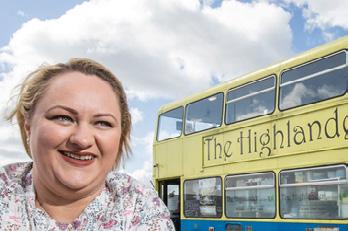
Through this challenging period, I will forever be grateful for the calm voice of FSB at the end of the phone. In these times of need, FSB has been by my side. It gave me a voice that was heard, when I thought my voice was too small.
Steve Gill LemonTop
Durham-based LemonTop, run by director Steve Gill, specialises in brand development for the drinks industry. Steve joined FSB after attending an FSB COVID-19 online support event. He found this an opportunity to meet business owners and industry leaders from a wide range of other sectors.
I was really impressed with the FSB events; everyone is welcomed and at ease. They’ve helped us all keep connecting, and supporting each other at a very uncertain time.


Joanne Davies Live event professional
Joanne Davies is a live event professional based in Yorkshire and the Humber who usually tours internationally. Businesses in the arts sector have been hard hit by the COVID-19 pandemic and Joanne found that her FSB membership really came into its own during this time.
During lockdown, I began online networking to help promote my business and to find opportunities to upskill and gain new experience given that many live events were moving online. I discovered FSB online support events such as networking, industry webinars and awareness sessions that have really helped.
RETURN TO CONTENTS fsb.org.uk 23
CARING FOR OUR MEMBERS’ WELLBEING
Supporting our members’ mental and physical wellbeing to help them to flourish has been an increasing priority for us over recent years. Starting and growing a small business is hugely exciting, empowering and profitable. However, it can also bring personal stress, feelings of loneliness and sometimes the responsibility of looking after the wellbeing of employees.
Whether it be creating new resources and tips, working with partners such as Mind, the mental health charity, and Heads Together, an initiative from the Royal Foundation of the Duke and Duchess of Cambridge, to create new resources; or sharing our members’ personal stories of mental health challenges, or opening up member networking opportunities at local level, we aim to support our members, knowing that mental and physical resilience is one of the key linchpins to success for small businesses. Further to this, becoming self-employed is often one of the best ways into the economic landscape for those that do have a mental health or physical challenge.
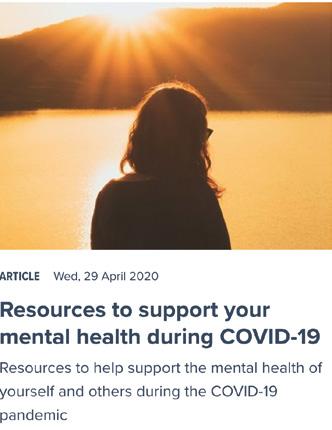
ARTICLE Wed, 29 April 2020
Resources to support your mental health during COVID-19
Resources to help support the mental health of yourself and others during the COVID-19 pandemic.
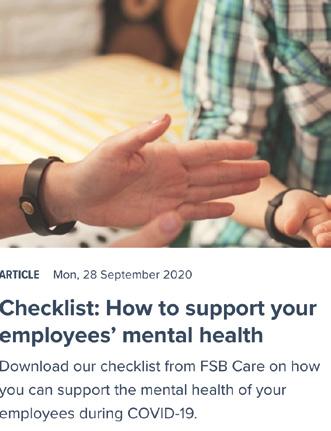
ARTICLE Mon, 28 September 2020
Checklist: How to support your employees’ mental health
Download our checklist from FSB Care on how you can support the mental health of your employees during COVID-19.
Through the coronavirus (COVID-19) pandemic, we’ve aimed to support our members, and the wider small business and self-employed community, with as many resources, tools and guidance as possible, from access to finance to developing new skills. Crucial to this palette of provision, was our support for their mental and physical health and wellbeing through the most difficult of times. We expanded our FSB Wellbeing hub, producing new content and signposting to further specialist help, including FSB Care, the medical and health service available to our members, and worked with organisations including Mind to develop new resources and help.
In partnership with ukactive and Sport England, we created a series of resources to help members to bring more physical activity into their day. A new FSB Care hub was launched and the medical team supported our members through turbulent times, producing videos covering tips for resilience and coping strategies.

ARTICLE
Checklist: Looking after your mental health during COVID-19
FSB Care share advice for looking after your mental health and where you can go if you need support..

24 Federation of Small Businesses: Annual Report and Financial Statements 2019-20
Tue, 06 October 2020
Visit fsb.org.uk/care to learn more about how FSB Care can support you. Call: 0808 2020 888 Email:@FSBCustomerCarecustomerservices@fsb.org.uk
after your mental health during COVID-19 Your mental health and wellbeing is always important, especially during these challenging times. Christine Husbands from FSB Care shares tips for how you can look after your mental health. *8am to 6pm, Monday to Friday, excluding Bank Holidays The first step is to recognise that things are becoming too much for us and acknowledge it. Often, we feel better after we’ve talked it through with someone, whether it’s with friends, family or an FSB Care nurse. Accept that it’s normal to have sad or anxious thoughts, it doesn’t necessarily mean you are mentally unwell. Practice good self-care by looking after yourself, being kind to yourself and giving yourself a break – give yourself permission to rest. Getting active increases serotonin and dopamine whilst decreasing adrenaline and cortisol, which increase during times of stress. A good night’s sleep makes our brains more alert, helps our memory and boosts our metabolism. Practice gratitude – be grateful for the positive things in your life and what you’ve achieved. Remember, feelings of stress, anxiety and worry are normal reactions to a very difficult time in our lives. Set short-term goals and celebrate the success of achieving those. Seek help if you need it and appreciate the value of your network. Notice small changes in your thoughts, behaviours, emotions e.g. are you feeling overwhelmed by tasks that you usually wouldn’t think twice at, more irritable than usual, are you apprehensive about going out of the house or talking to others? Sometimes it helps to keep a diary of how you feel. FSB Care are here to guide you if you’re struggling to get the help you need. One of our qualified mental health nurses can provide emotional support, whether it’s talking through your worries, sharing your concerns or answering your questions. Visit fsb.org.uk/care to learn more about how FSB Care can support you. Call: 0808 2020 888* Email:@FSBCustomerCarecustomerservices@fsb.org.uk How to support your employees’ mental health Whilst not a substitute for professional mental health support, your small business has a key role to play in supporting employees who may be concerned about their mental health during COVID-19. *8am to 6pm, Monday to Friday, excluding Bank Holidays Practice empathetic active listening. Take the time to speak to employees, ask open questions and most importantly listen non-judgementally and without interruption. Be self-aware and appreciate the impact of employer communication on your employee. Do they seem comfortable with the conversation? Would they prefer a different method, for example a phone call or email? Signpost to relevant sources of help, including charities such as Mind or The Samaritans, or employee benefits that are available. FSB Care can help you to provide the right resources. Ask what would help them. It may not always be possible to deliver on all needs, but it will help to understand their situation. Try to pick-up on verbal and non-verbal messages and signs that something may not be right. Summarise what has been said. Be supportive and non-judgemental. Follow-up regularly and constantly reassess.
Looking
FINANCIAL STATEMENTS
Group Strategic Report, Report of the Directors and Consolidated Financial Statements for the Year Ended 30 September 2020 for
National Federation of Self Employed and Small Businesses Limited
fsb.org.uk 25 RETURN TO CONTENTS
COMPANY INFORMATION
For the Year Ended 30 September 2020
DIRECTORS: M H Cherry
M G McTague
P B C Davys
G Lovatt
A L Lay
M D Ulyatt
I D O’Donnell
T Lockwood
S J T Askew
REGISTERED OFFICE: Sir Frank Whittle Way
Blackpool Business Park Blackpool Lancashire FY4 2FE
REGISTERED NUMBER: 01263540
AUDITORS: Haines Watts
Statutory Auditor
3rd Floor Pacific Chambers 11-13 Victoria Street Liverpool Merseyside L2 5QQ
26 RETURN TO CONTENTS Federation of Small Businesses
GROUP STRATEGIC REPORT
For the Year Ended 30 September 2020
The directors present their strategic report of the company and the group for the year ended 30 September 2020.
REVIEW OF BUSINESS
The principal activity of the National Federation of Self Employed and Small Businesses Limited (the Federation) continues to be that of the promotion and furtherance of the interests of persons who are self-employed, direct or control small businesses, and the provision of a national voice and platform for such persons.
The results for the group (FSB) show a surplus for the financial year of £0.7m (2019: surplus £1.3m). This is after accounting for an unrealised gain of £0.06m resulting from an increase in the carrying value of investments (2019: unrealised gain of £0.14m). Income from subscriptions and joining fees, which provided 97% of the group’s income (2019: 96%) amounted to £26.1m (2019: £26.5m). General reserves increased to £16.6m (2019: £15.8m) and the net cash inflow from operating activities was £1.1m (2019: £1.2m).
The consolidated financial statements include the results of its three subsidiary companies; FSB Publications Limited, the principal activity of which is the publication of First Voice magazine, F.S.B. (Member Services) Limited, which arranges additional benefits on behalf of FSB members and FSB Recruitment Limited, which provides recruitment services for FSB.
FSB is organised across the UK through geographical areas in the devolved nations and English regions. As well as UK-wide events and campaigns, local events and campaigns are delivered throughout these regions and nations to engage with members and create a real small business community.
Throughout the year, FSB also publishes First Voice magazine, policy reports and digital content that raises awareness of issues that affect small businesses and the self-employed to a range of key audiences. This is founded on robust research of its members’ opinions and experiences, and often results in successfully influencing Government policy.
A crucial aim of FSB’s campaigns is to engage with members, amplifying their voices and making them an active part of the FSB community whilst effectively engaging with policy-makers and ultimately affecting change. Over the last financial year, FSB campaigned on numerous important issues that affect its members, not least ensuring that generous government support was put in place for as many members as possible that were affected by the national coronavirus pandemic; whilst communicating effectively to members to support them through an unprecedented crisis and providing them with numerous resources and tools to help them with their survival in the first instance, and opportunities for new growth in the midst of a very different world.
As the coronavirus (COVID-19) pandemic began to take hold, in February 2020, FSB’s public relations strategy quickly pivoted to deliver the FSB COVID-19 Supporting Small Businesses campaign, rapidly positioning FSB as the leading voice of the UK’s business community on the crisis to all key audiences, including governments, the media and the small business and self-employed community.
The focus of the first half of the financial year had been on delivering the Back to Business campaign to influence UK party General Election manifestos to adopt key FSB policy recommendations.
Back to Business: FSB General Election Manifesto 2019
In autumn 2019, FSB delivered an integrated public relations and public affairs campaign, Back to Business, for the UK General Election. Hinging around a new FSB manifesto publication, it was supported by strategic social media content, media coverage, owned-media, stakeholder engagement and a hustings event held in central London. The hustings gave FSB members the opportunity to question directly the then-Chancellor of the Exchequer, Shadow Chancellor of the Exchequer and Liberal Democrat Deputy Leader.
Our engagement around the Parties’ manifestos resulted, in particular, in the commitments in the Conservative Party Manifesto, to increase the Employment Allowance for small firms and reduce national insurance for the employment of ex-Armed Forces personnel, both of which were subsequently delivered in Spring Budget 2020. We also secured specific commitments in the Governing Party’s programme to reduce business rates in England through a fundamental review, to clamp down on late payment, and to expand Start-Up Loans.
fsb.org.uk 27 RETURN TO CONTENTS
Group Strategic Report
For the Year Ended 30 September 2020
Apprenticeships: Growing Small Businesses in Northern Ireland
Northern Ireland had its first ever Apprenticeship Week in February 2020 and through this campaign, FSB raised awareness to its members of the benefits of taking on apprenticeships, showcasing members who have successfully offered apprenticeships in businesses.
She Means STEM: Breaking stereotypes in small business
This campaign in March 2020 increased the visibility of self-employed and small business owner women in the science, technology, engineering and maths (STEM) sector and communicated FSB’s key recommendations to support women in enterprise to policy makers, using International Women’s Day as the opportunity.
Our Business is Wales
In January 2020, FSB Wales launched its headline campaign Our Business is Wales which has focused on engaging with members and business owners in order to hear directly from small firms ahead of the 2021 Senedd election. During the course of the year, FSB Wales spoke to hundreds of businesses through survey work, virtual events, social media activity and many other conversations in order to draw together the views of the Welsh business community and make a number of asks of the next Welsh Government in the upcoming FSB Wales manifesto.
#FSBmyTown
FSB Scotland launched this campaign to tackle the big challenges facing Scottish towns and to secure their longterm future. The campaign centred around pushing FSB’s practical proposals for dealing with key town centre issues – from filling empty units to creating shared banking hubs –outlined in the FSB report, Transforming Towns. The public and politicians got involved and showed their support by, for example, taking a video or selfie in their town and sharing it on social media with the hashtag #FSBmyTown, and by sharing the campaign infographics made available on the dedicated campaign hub.
COVID-19: Supporting Small Businesses
This agile and responsive campaign was developed and delivered in real time as this unprecedented national and global crisis unfolded, launching in mid-February 2020. The objectives were to position FSB as the leading voice of the small business and self-employed community in the media and across digital to retain members; position FSB effectively to political decision makers; broker wider public support for small businesses and the self-employed and provide members and small businesses with as much genuine and salient support as possible.
An imaginative campaign that used key public relations and communications strategies to communicate effectively that FSB was proactively and creatively supporting small businesses and the self-employed through the pandemic crisis, emotionally, financially, practically and politically. Members were actively engaged and played a huge role in supporting the campaign efforts in a spontaneous and passionate way. In effect, acting as brand ambassadors.
The campaign created a narrative and content that was highly engaging, bringing people together, at a time of isolation and enabling member-to-member support – the linchpin of the FSB brand. It positioned the UK’s small businesses and the self-employed in a positive light by sharing their constructive contribution to helping with the national emergency, building wide support of the sector and helping to strengthen FSB’s case for the government support achieved.
A fully integrated campaign that utilised media relations; digital; out of home (OOH); web and event tactics with a strong emphasis on real-time social media communications and engagement.
PRINCIPAL RISKS AND UNCERTAINTIES
The responsibility for risk management and the internal control environment resides with the Board of Directors. FSB has a senior management team, subsidiary companies and various committees reporting to the Board of Directors, that control and manage various activities, identifying on an on-going basis any potential risks faced by the organisation and proposing solutions to mitigate these.
The list below includes the principal risks that may impact the company achieving its strategic objectives. The list does not include all of the risks faced by the company, nor does it list the risks in order of priority.
28 RETURN TO CONTENTS Federation of Small Businesses
Group Strategic Report For the Year Ended 30 September 2020
STRATEGY
FSB’s mission is to help smaller businesses achieve their ambitions. The group’s vision is to be recognised as the most influential and trusted organisation representing the voice of all small businesses, in every region and nation of the UK. FSB’s strategy is to continue to pursue the corporate objectives (to be fully representative of the whole UK small business community, to provide support, advice and practical solutions to our community of members, to advocate on behalf of small businesses and the self-employed, providing a powerful voice heard by Governments and key decision makers, and to create a financial climate which ensures best value for members and safeguards FSB for the future).
FSB takes seriously all issues with regard to recycling and the environment. Within the organisation there is an active preference towards recycling wherever possible and minimising any impact on the environment. Internally there has been a move to reduce the use of paper and aim for a paperless office environment, together with investment in virtual meeting technology to reduce overall travel requirements. Communications with members, including membership renewal and publications, are also now being distributed digitally. FSB is aiming to increase digital consumption of its First Voice magazine content whilst reducing print circulation. We also look towards best practice in terms of refurbishment projects on our property, and adopting energy saving options wherever possible.
The organisation’s strategy for growth is underpinned by excellence in representation and service, and ongoing development of relevant products and services to enhance the experience of members, improve retention levels and attract growing numbers of new members.
BUSINESS INTERRUPTION AS A RESULT OF COVID-19
Business disruption due to the COVID-19 pandemic has provided the group with a present and future risk to consider. The group has taken steps to ensure the safety of its employees and stakeholders, and to ensure that it remains able to operate efficiently and effectively. The directors have assessed the potential impact on income and costs of a range of possible scenarios relating to the evolving Covid-19 situation. The directors have developed business plans to address this risk, which will continue to be monitored closely. It is their opinion that the group is sufficiently resilient to prosper through this difficult period.
ECONOMIC CONDITIONS
The company operates in a competitive industry, and its ability to attract and retain members may be impacted by economic conditions, business confidence and the behaviour of competitors. The Board of Directors reviews performance and ensures that management is focused on key priorities to mitigate this risk, including enhancing the range of services offered to members, maintaining excellence in service and ensuring prices are competitive.
BRAND AND REPUTATION
The organisation is non-political, engaged in representing and promoting the interests of its members. Failure to meet the expectations of members may impact on the brand and reputation and member loyalty. The Board of Directors determine that procedures are in place to ensure that its non-political position and service level expectations are not compromised.
TREASURY MEASUREMENT
The group has £20.8m cash and £3.9m investment balances as at 30 September 2020 and changes in investment conditions may expose the company to risks of poor returns. The company invests its funds for a combination of liquidity and returns, ensuring that cash is deposited on varying terms and with various financial institutions, and that investments are made into mixed portfolios with long term rather than short term growth aims.
KEY PERFORMANCE INDICATORS
The directors consider the surplus or deficit on ordinary activities before taxation to be the main financial KPI for the business, and monitor a range of non-financial KPIs, the principal ones being as follows:
- Membership numbers
- New member numbers
- Member retention
ON BEHALF OF THE BOARD:
M H Cherry OBE Director
Date: 2 December 2020
fsb.org.uk 29 RETURN TO CONTENTS
REPORT OF THE DIRECTORS
For the Year Ended 30 September 2020
The directors present their report with the financial statements of the company and the group for the year ended 30 September 2020.
DIRECTORS
The directors shown below have held office during the whole of the period from 1 October 2019 to the date of this report.
M H Cherry
M G McTague
P B C Davys
G Lovatt
I D O’Donnell
A L Lay
M D Ulyatt
S J T Askew
T Lockwood
Other changes in directors holding office are as follows:
D Miles – resigned 22.04.20
G M MacEwan – resigned 13.08.20
FUTURE DEVELOPMENTS
The Board of Directors continues to progress a programme of modernisation to enable the group to continue to provide excellent representation and service to members from the whole UK smaller business community. This programme involves continuous improvement in all areas of the group’s operations, including enhancements to services offered and developments in communication.
EMPLOYEE INVOLVEMENT
The group has continued its practice of keeping employees informed of matters affecting them as employees and the financial and economic factors affecting the performance of the group. This is achieved through departmental meetings and presentations to all employees.
Applications for employment by disabled persons are given full and fair consideration for all vacancies in accordance with their particular aptitudes and abilities. In the event of employees becoming disabled, every effort is made to retain them in order that the employment with the group may continue.
It is the policy of the group that training, career development and promotion opportunities should be available to all employees.
STATEMENT OF DIRECTORS’ RESPONSIBILITIES
The directors are responsible for preparing the Group Strategic Report, the Report of the Directors and the financial statements in accordance with applicable law and regulations.
Company law requires the directors to prepare financial statements for each financial year. Under that law the directors have elected to prepare the financial statements in accordance with United Kingdom Generally Accepted Accounting Practice (United Kingdom Accounting Standards and applicable law). Under company law the directors must not approve the financial statements unless they are satisfied that they give a true and fair view of the state of affairs of the company and the group and of the surplus or deficit of the group for that period. In preparing these financial statements, the directors are required to:
- select suitable accounting policies and then apply them consistently;
- make judgements and accounting estimates that are reasonable and prudent; and
- prepare the financial statements on the going concern basis unless it is inappropriate to presume that the company will continue in business.
The directors are responsible for keeping adequate accounting records that are sufficient to show and explain the company’s and the group’s transactions and disclose with reasonable accuracy at any time the financial position of the company and the group and enable them to ensure that the financial statements comply with the Companies Act 2006. They are also responsible for safeguarding the assets of the company and the group and hence for taking reasonable steps for the prevention and detection of fraud and other irregularities.
STATEMENT AS TO DISCLOSURE OF INFORMATION TO AUDITORS
So far as the directors are aware, there is no relevant audit information (as defined by Section 418 of the Companies Act 2006) of which the group’s auditors are unaware, and each director has taken all the steps that he or she ought to have taken as a director in order to make himself or herself aware of any relevant audit information and to establish that the group’s auditors are aware of that information.
30 RETURN TO CONTENTS Federation of Small Businesses
Report of the Directors
For the Year Ended 30 September 2020
AUDITORS
The auditors, Haines Watts, will be proposed for re-appointment at the forthcoming Annual General Meeting.
ON BEHALF OF THE BOARD:
M H Cherry OBE Director
Date: 2 December 2020
fsb.org.uk 31 RETURN TO CONTENTS
REPORT OF THE INDEPENDENT AUDITORS
To the Members of National Federation of Self Employed and Small Businesses Limited
OPINION
We have audited the financial statements of National Federation of Self Employed and Small Businesses Limited (the ‘parent company’) and its subsidiaries (the ‘group’) for the year ended 30 September 2020 which comprise the Consolidated Statement of Comprehensive Income, Consolidated Balance Sheet, Company Balance Sheet, Consolidated Statement of Changes in Equity, Company Statement of Changes in Equity, Consolidated Cash Flow Statement and Notes to the Consolidated Cash Flow Statement, Notes to the Financial Statements, including a summary of significant accounting policies. The financial reporting framework that has been applied in their preparation is applicable law and United Kingdom Accounting Standards, including Financial Reporting Standard 102 ‘The Financial Reporting Standard applicable in the UK and Republic of Ireland’ (United Kingdom Generally Accepted Accounting Practice).
In our opinion the financial statements:
- give a true and fair view of the state of the group’s and of the parent company affairs as at 30 September 2020 and of the group’s surplus for the year then ended;
- have been properly prepared in accordance with United Kingdom Generally Accepted Accounting Practice; and
- have been prepared in accordance with the requirements of the Companies Act 2006.
BASIS FOR OPINION
We conducted our audit in accordance with International Standards on Auditing (UK) (ISAs (UK)) and applicable law. Our responsibilities under those standards are further described in the Auditors’ responsibilities for the audit of the financial statements section of our report. We are independent of the group in accordance with the ethical requirements that are relevant to our audit of the financial statements in the UK, including the FRC’s Ethical Standard, and we have fulfilled our other ethical responsibilities in accordance with these requirements. We believe that the audit evidence we have obtained is sufficient and appropriate to provide a basis for our opinion.
CONCLUSIONS RELATING TO GOING CONCERN
We have nothing to report in respect of the following matters in relation to which the ISAs (UK) require us to report to you where:
- the directors’ use of the going concern basis of accounting in the preparation of the financial statements is not appropriate, or
- the directors have not disclosed in the financial statements any identified material uncertainties that may cast significant doubt about the company’s ability to continue to adopt the going concern basis of accounting for a period of at least twelve months from the date when the financial statements are authorised for issue.
However, not all future events or conditions can be predicted. The COVID-19 viral pandemic is one of the most significant economic events for the UK with unprecedented levels of uncertainty of outcomes. It is therefore difficult to evaluate all of the potential implications on the company’s trade, customers, suppliers and wider economy. The Directors’ view on the impact of COVID-19 is disclosed in the Group Strategic Report.
OTHER INFORMATION
The directors are responsible for the other information. The other information comprises the information in the Group Strategic Report and the Report of the Directors, but does not include the financial statements and our Report of the Auditors thereon.
Our opinion on the financial statements does not cover the other information and, except to the extent otherwise explicitly stated in our report, we do not express any form of assurance conclusion thereon.
In connection with our audit of the financial statements, our responsibility is to read the other information and, in doing so, consider whether the other information is materially inconsistent with the financial statements or our knowledge obtained in the audit or otherwise appears to be materially misstated. If we identify such material inconsistencies or apparent material misstatements, we are required to determine whether there is a material misstatement in the financial statements or a material misstatement of the other information. If, based on the work we have performed, we conclude that there is a material misstatement of this other information, we are required to report that fact. We have nothing to report in this regard.
OPINION ON OTHER MATTERS PRESCRIBED BY THE COMPANIES ACT 2006
In our opinion, based on the work undertaken in the course of the audit:
- the information given in the Group Strategic Report and the Report of the Directors for the financial year for which the financial statements are prepared is consistent with the financial statements; and
- the Group Strategic Report and the Report of the Directors have been prepared in accordance with applicable legal requirements.
32 RETURN TO CONTENTS Federation of Small Businesses
Report of the Independent Auditors
To the Members of National Federation of Self Employed and Small Businesses Limited
MATTERS ON WHICH WE ARE REQUIRED TO REPORT BY EXCEPTION
In the light of the knowledge and understanding of the group and the parent company and its environment obtained in the course of the audit, we have not identified material misstatements in the Group Strategic Report or the Report of the Directors.
We have nothing to report in respect of the following matters where the Companies Act 2006 requires us to report to you if, in our opinion:
- adequate accounting records have not been kept by the parent company, or returns adequate for our audit have not been received from branches not visited by us; or
- the parent company financial statements are not in agreement with the accounting records and returns; or
- certain disclosures of directors’ remuneration specified by law are not made; or
- we have not received all the information and explanations we require for our audit.
RESPONSIBILITIES OF DIRECTORS
As explained more fully in the Statement of Directors’ Responsibilities set out on page thirty, the directors are responsible for the preparation of the financial statements and for being satisfied that they give a true and fair view, and for such internal control as the directors determine necessary to enable the preparation of financial statements that are free from material misstatement, whether due to fraud or error.
In preparing the financial statements, the directors are responsible for assessing the group’s and the parent company’s ability to continue as a going concern, disclosing, as applicable, matters related to going concern and using the going concern basis of accounting unless the directors either intend to liquidate the group or the parent company or to cease operations, or have no realistic alternative but to do so.
AUDITORS’ RESPONSIBILITIES FOR THE AUDIT OF THE FINANCIAL STATEMENTS
Our objectives are to obtain reasonable assurance about whether the financial statements as a whole are free from material misstatement, whether due to fraud or error, and to issue a Report of the Auditors that includes our opinion. Reasonable assurance is a high level of assurance, but is not a guarantee that an audit conducted in accordance with ISAs (UK) will always detect a material misstatement when it exists. Misstatements can arise from fraud or error and are considered material if, individually or in the aggregate, they could reasonably be expected to influence the economic decisions of users taken on the basis of these financial statements.
A further description of our responsibilities for the audit of the financial statements is located on the Financial Reporting Council’s website at www.frc.org.uk/ auditorsresponsibilities. This description forms part of our Report of the Auditors.
USE OF OUR REPORT
This report is made solely to the company’s members, as a body, in accordance with Chapter 3 of Part 16 of the Companies Act 2006. Our audit work has been undertaken so that we might state to the company’s members those matters we are required to state to them in a Report of the Auditors and for no other purpose. To the fullest extent permitted by law, we do not accept or assume responsibility to anyone other than the company and the company’s members as a body, for our audit work, for this report, or for the opinions we have formed.
Mr Michael Forshaw (Senior Statutory Auditor) for and on behalf of Haines Watts
Statutory Auditor
3rd Floor Pacific Chambers 11-13 Victoria Street
Liverpool Merseyside L2 5QQ
Date: 2 December 2020
fsb.org.uk 33 RETURN TO CONTENTS
CONSOLIDATED STATEMENT OF COMPREHENSIVE INCOME
For the Year Ended 30 September 2020
The notes form part of these financial statements
1,263,226
34 RETURN TO CONTENTS Federation of Small Businesses Notes 30.9.20 (£) 30.9.19 (£) Turnover 26,104,478 26,478,570 Cost of sales 2,567,819 2,575,095 Gross Surplus 23,536,659 23,903,475 Administrative expenses 23,895,246 24,066,263 (358,587)
Other operating income 785,757 1,132,293 Operating Surplus 4 427,170 969,505 Unrealised gain on investment 5 64,752 144,710 491,922 1,114,215 Interest receivable and similar income 155,840 140,991 Surplus Before Taxation 647,762 1,255,206 Tax on surplus 6 97,006 8,020 Surplus for the Financial Year 744,768
Other Comprehensive Income -Total Comprehensive Income for The Year 744,768
Surplus attributable to: Owners of the parent 744,768 1,263,226 Total comprehensive income attributable to: Owners of the parent 744,768 1,263,226
(162,788)
1,263,226
CONSOLIDATED BALANCE SHEET
30 September 2020
The financial statements were approved by the Board of Directors on 2 December 2020 and were signed on its behalf by:
M H Cherry OBE Director
The notes form part of these financial statements
fsb.org.uk 35 RETURN TO CONTENTS Notes 30.9.20 (£) 30.9.19 (£) Fixed Assets Intangible assets 8 16,636 40,797 Tangible assets 9 4,745,398 4,959,489 Investments 10 -4,762,034 5,000,286 Current Assets Debtors 11 956,936
Investments 12 3,931,187 3,866,436 Cash at bank 20,760,130 19,691,629 25,648,253 24,700,913 Creditors Amounts falling due within one year 13 13,639,545 13,687,527 Net Current Assets 12,008,708 11,013,386 Total Assets Less Current Liabilities 16,770,742 16,013,672 Provisions for Liabilities 16 176,925 164,623 Net Assets 16,593,817 15,849,049 Reserves Profit and loss account 17 16,593,817 15,849,049 16,593,817 15,849,049
1,142,848
COMPANY BALANCE SHEET
30 September 2020
The financial statements were approved by the Board of Directors on 2 December 2020 and were signed on its behalf by:
M H Cherry OBE Director
The notes form part of these financial statements
36 RETURN TO CONTENTS Federation of Small Businesses Notes 30.9.20 (£) 30.9.19 (£) Fixed Assets Intangible assets 8 16,636 40,797 Tangible assets 9 4,744,031 4,953,734 Investments 10 2,101 2,101 4,762,768
Current Assets Debtors 11 3,083,088 2,793,317 Investments 12 3,931,187 3,866,436 Cash at bank 20,457,672 19,187,374 27,471,947 25,847,127 Creditors Amounts falling due within one year 13 15,719,481 15,069,999 Net Current Assets 11,752,466 10,777,128 Total Assets Less Current Liabilities 16,515,234 15,773,760 Provisions for Liabilities 16 176,925 164,623 Net Assets 16,338,309 15,609,137 Reserves Profit and loss account 17 16,338,309 15,609,137 16,338,309 15,609,137 Company’s profit for the financial year 729,172 1,365,319
4,996,632
CONSOLIDATED STATEMENT OF CHANGES IN EQUITY
For the Year Ended 30 September 2020
COMPANY STATEMENT OF CHANGES IN EQUITY
the Year Ended 30 September 2020
The notes form part of these financial statements
fsb.org.uk 37 RETURN TO CONTENTS Retained earnings (£) Total equity (£) Balance at 1 October 2018 14,585,823 14,585,823 Changes in equity Total comprehensive income 1,263,226 1,263,226 Balance at 30 September 2019 15,849,049 15,849,049 Changes in equity Total comprehensive income 744,768 744,768 Balance at 30 September 2020 16,593,817 16,593,817
Retained earnings (£) Total equity (£) Balance at 1 October 2018 14,243,818 14,243,818 Changes in equity Total comprehensive income 1,365,319 1,365,319 Balance at 30 September 2019 15,609,137 15,609,137 Changes in equity Total comprehensive income 729,172 729,172 Balance at 30 September 2020 16,338,309 16,338,309
For
CONSOLIDATED CASH FLOW STATEMENT
For the Year Ended 30 September 2020
The notes form part of these financial statements
38 RETURN TO CONTENTS Federation of Small Businesses Notes 30.9.20 (£) 30.9.19 (£) Cash flows from operating activities Cash generated from operations 1 1,010,586 1,198,034 Tax received 22,863 41,204 Net cash from operating activities 1,033,449
flows from investing activities Purchase of intangible fixed assets -
Purchase of tangible fixed assets (120,788) (199,287) Sale of tangible fixed assets - 620 Interest received 155,840 140,991 Net cash from investing activities 35,052 (67,778) Increase in cash and cash equivalents 1,068,501 1,171,460 Cash and cash equivalents at beginning of year 2 19,691,629 18,520,169 Cash and cash equivalents at end of year 2 20,760,130
1,239,238 Cash
(10,102)
19,691,629
NOTES TO THE CONSOLIDATED CASH FLOW STATEMENT
For the Year Ended 30 September 2020
1. Reconciliation of Deficit Before Taxation to Cash Generated from Operations
2. Cash and Cash Equivalents
The amounts disclosed on the Cash Flow Statement in respect of cash and cash equivalents are in respect of these Balance Sheet amounts:
(£)
ended 30 September 2020
Year ended 30 September 2019
The notes form part of these financial statements
fsb.org.uk 39 RETURN TO CONTENTS
30.9.20 (£) 30.9.19 (£) Surplus - before taxation 647,762 1,255,206 Depreciation charges 334,878 319,341 Profit on disposal
fixed assets - (231) Amortisation
24,161 24,540 Unrealised gain on investment (64,752) (144,710) Finance income (155,840) (140,991) 786,209 1,313,155 Decrease in trade and other debtors 185,915 487,846 Increase/(decrease)
trade
38,462 (602,967) Cash generated
1,010,586
of
charges
in
and other creditors
from operations
1,198,034
30.9.20
1.10.19
Cash and cash equivalents 20,760,130 19,691,629 30.9.19 (£) 1.10.18 (£)
(£)
Year
Cash and cash equivalents 19,691,629 18,520,169
NOTES TO THE CONSOLIDATED FINANCIAL STATEMENTS
For the Year Ended 30 September 2020
1. GENERAL INFORMATION
The company is a private company limited by guarantee without share capital (Co No 01263540) and is incorporated in England and Wales. The address of the registered office is Sir Frank Whittle Way, Blackpool Business Park, Blackpool, Lancashire, FY4 2FE.
2. ACCOUNTING POLICIES
Basis of preparing the financial statements
These financial statements have been prepared in accordance with Financial Reporting Standard 102 “The Financial Reporting Standard applicable in the UK and Republic of Ireland” and the Companies Act 2006. The financial statements have been prepared under the historical cost convention.
The accounts of the subsidiaries FSB Publications Limited, F.S.B. (Member Services) Limited and FSB Recruitment Limited have been prepared on a going concern basis. This has only been possible as a result of the Federation’s continued contractual arrangements with these businesses.
Basis of consolidation
The consolidated financial statements of the Federation (which include Federation offices, regions and committees) include the financial statements of FSB Publications Limited, F.S.B. (Member Services) Limited and FSB Recruitment Limited, all being 100% owned subsidiaries of the Federation.
Critical accounting judgements and key sources of estimation uncertainty
There are no key assumptions concerning the future, and other key sources of estimation uncertainty at the reporting date, that have a significant risk of causing a material adjustment to the carrying amounts of assets and liabilities within the next financial year.
Turnover
Turnover comprises membership subscriptions.
Membership subscriptions, on receipt, are deferred and released to income over the period to which the membership relates.
Other operating income
Other operating income relates to commissions received from service providers which are recognised in the period in which they are earned.
Interest income
Interest income is recognised in the consolidated statement of comprehensive income using the effective interest method.
Intangible fixed assets
Geographical Recruitment Areas acquired by FSB Recruitment Limited have been amortised over their expected useful economic lives as determined by the Directors. The useful economic lives of the Areas will vary depending upon a number of factors including location and size. The Areas are amortised on a straight line basis over periods of between three and six years.
Intangible fixed assets are stated at cost less accumulated amortisation. Amortisation is provided at rates calculated using the straight-line method, to write off the cost of the fixed assets over their expected useful lives.
Goodwill 3-6 years Straight line basis
Computer software 3 years Straight line basis
Tangible fixed assets
Tangible fixed assets are stated at cost less depreciation.
Depreciation is provided at rates calculated to write off the cost of fixed assets over their expected useful lives.
Freehold and long leasehold buildings 50 years Straight line basis
Motor vehicles 4 years Straight line basis
Fixtures, fittings and office equipment 5 years Straight line basis
Computer equipment 3 years Straight line basis
Investments
The company has investments, in discretionary managed portfolio funds, and as these are considered by the directors to be readily convertible into cash in the short term, they are held under current assets in the financial statements.
The unrealised gains and losses on these investments are included in the consolidated income statement.
40 RETURN TO CONTENTS Federation of Small Businesses
Notes to the Consolidated Financial Statements - continued For the Year Ended 30 September 2020
2. ACCOUNTING POLICIES (continued)
Debtors
Short term debtors are measured at transaction price, less any impairment.
Cash and cash equivalents
Cash is represented by cash in hand and deposits with financial institutions repayable without penalty on notice of not more than 12 months.
Creditors
Short term creditors are measured at the transaction price. Other financial liabilities, are measured initially at fair value, net of transaction costs, and are measured subsequently at amortised cost using the effective interest method.
Financial instruments
The group only enters into basic financial instrument transactions that result in the recognition of financial assets and liabilities like trade and other debtors and creditors.
Taxation
Taxation for the year comprises current and deferred tax. Tax is recognised in the Consolidated Statement of Comprehensive Income, except to the extent that it relates to items recognised in other comprehensive income or directly in equity.
Current or deferred taxation assets and liabilities are not discounted.
Current tax is recognised at the amount of tax payable using the tax rates and laws that have been enacted or substantively enacted by the balance sheet date.
Deferred tax
Deferred tax is recognised in respect of all timing differences that have originated but not reversed at the balance sheet date.
Timing differences arise from the inclusion of income and expenses in tax assessments in periods different from those in which they are recognised in financial statements. Deferred tax is measured using tax rates and laws that have been enacted or substantively enacted by the year end and that are expected to apply to the reversal of the timing difference.
Unrelieved tax losses and other deferred tax assets are recognised only to the extent that it is probable that they will be recovered against the reversal of deferred tax liabilities or other future taxable profits.
Pension costs and other post-retirement benefits
The group operates a defined contribution pension scheme. Contributions payable to the group’s pension scheme are charged to profit or loss in the period to which they relate.
Operating leases
Rentals applicable to operating leases, where substantially all of the benefits and risks of ownership remain with the lessor, are charged against profit on a straight line basis over the period of the lease.
Going concern
The Directors have reviewed and considered relevant information, including the annual budget and future cash flows for the group in making their assessment. In particular, in response to the COVID-19 pandemic, the Directors have tested their group cash flow analysis to take into account the impact on their business of possible scenarios brought on by the impact of COVID-19, alongside the measures that they can take to mitigate the impact. Based on these assessments, given the measures that could be undertaken to mitigate the current adverse conditions, and the current resources available, the Directors have concluded that they can continue to adopt the going concern basis in preparing the annual report and accounts.
fsb.org.uk 41 RETURN TO CONTENTS
Continued...
Notes to the Consolidated Financial Statements - continued For the Year Ended 30 September 2020
3. EMPLOYEES AND DIRECTORS
Staff costs, excluding directors’ remuneration, were as follows:
No retirement benefits were accruing for directors (2019 – nil) in respect of defined contribution pension schemes. All directors and certain senior employees who have authority and responsibility for planning, directing and controlling the activities of the group are considered to be key management personnel. Total remuneration in respect of these individuals is £1,829,026 (2019 – £1,534,093).
42 RETURN TO CONTENTS Federation of Small Businesses
30.9.20 (£) 30.9.19 (£) Wages and salaries 8,605,646 8,313,706 Social security costs 882,048 865,402 Other pension costs 492,222 465,336 9,979,916 9,644,444 The average monthly number of employees excluding directors during the year was as follows: 30.9.20 30.9.19 Head office 53 48 Press and parliamentary offices 43 44 Regions 58 59 Recruitment 50 52 Member Services 7 7 211 210 30.9.20 (£) 30.9.19 (£) Directors’ remuneration 317,631 325,843 Information regarding the highest paid director
30.9.20 (£) 30.9.19 (£) Emoluments etc. 65,000 65,000
is as follows:
Notes to the Consolidated Financial Statements - continued For the Year Ended 30 September 2020
4. OPERATING SURPLUS
The operating surplus (2019 - operating surplus) is stated after charging/ (crediting):
5.
6. TAXATION
Analysis of the tax charge
The tax charge on the surplus for the year was as follows:
UK corporation tax was charged at 19% in 2020 (2019 – 19%).
The company is taxable on interest received in the year. The company received interest of £155,840 (2019 - £140,991).
7. INDIVIDUAL STATEMENT OF COMPREHENSIVE INCOME
As permitted by Section 408 of the Companies Act 2006, the Income Statement of the parent company is not presented as part of these financial statements.
fsb.org.uk 43 RETURN TO CONTENTS
30.9.20 (£) 30.9.19 (£) Depreciation – owned assets 334,879 319,341 Profit on disposal of fixed assets - (231) Computer software amortisation 24,161 24,540 Auditors’ remuneration – company 18,933 18,688 Auditors’ remuneration – subsidiaries 11,643 9,995 Non-audit services – other services 45,351 23,719
GAIN
INVESTMENTS 30.9.20 (£) 30.9.19 (£) Unrealised gain on investment 64,752 144,710
ON
30.9.20 (£) 30.9.19 (£) Current tax: UK corporation tax 34,289 27,479 R&D tax reclaim (143,598) (62,994) Deferred tax 12,303 27,495 Tax on surplus (97,006) (8,020)
Continued...
Notes to the Consolidated Financial Statements - continued For the Year Ended 30 September 2020
8. INTANGIBLE FIXED ASSETS
44 RETURN TO CONTENTS Federation of Small Businesses
Group Goodwill (£) Computer software (£) Totals (£) COST At 1 October 2019 3,013,503 891,138 3,904,641 Additions - -Disposals - (2,596) (2,596) At 30 September 2020 3,013,503 888,542
AMORTISATION At 1 October 2019 3,013,503 850,341 3,863,844 Amortisation for year - 24,161 24,161 Eliminated on disposal - (2,596) (2,596) At 30 September 2020 3,013,503 871,906 3,885,409 NET BOOK VALUE At 30 September 2020 - 16,636 16,636 At 30 September 2019 - 40,797 40,797 Company Computer software (£) COST At 1 October 2019
AdditionsDisposals (2,596) At 30 September 2020 731,409 AMORTISATION At 1 October 2019 693,208 Amortisation for year 24,161 Eliminated on disposal (2,596) At 30 September 2020 714,773 NET BOOK VALUE At 30 September 2020 16,636 At 30 September 2019 40,797
3,902,045
734,005
Notes to the Consolidated Financial Statements - continued For the Year Ended 30 September 2020
9. TANGIBLE FIXED ASSETS
fsb.org.uk 45 RETURN TO CONTENTS
Group Freehold property (£) Fixtures and fittings(£) Motor vehicles (£) Computer equipment (£) Totals (£) COST At 1 October 2019 6,673,833 1,080,325 29,339 787,854 8,571,351 Additions 11,598 1,004 - 108,186 120,788 Disposals - (9,547) - (53,402) (62,949) At 30 September 2020 6,685,431 1,071,782 29,339 842,638 8,629,190 DEPRECIATION At 1 October 2019 2,012,817 974,656 18,957 605,432 3,611,862 Charge for year 134,041 84,210 3,616 113,012 334,879 Eliminated on disposal - (9,547) - (53,402) (62,949) At 30 September 2020 2,146,858 1,049,319 22,573 665,042 3,883,792 NET BOOK VALUE At 30 September 2020 4,538,573 22,463 6,766 177,596 4,745,398 At 30 September 2019 4,661,016 105,669 10,382 182,422 4,959,489 Company Freehold property (£) Fixtures and fittings(£) Motor vehicles (£) Computer equipment (£) Totals (£)
At 1 October 2019 6,673,832 1,058,403 29,339 783,235 8,544,809 Additions 11,598 1,004 - 108,186 120,788 Disposals - (9,547) - (53,402) (62,949) At 30 September 2020 6,685,430 1,049,860 29,339 838,019 8,602,648 DEPRECIATION At 1 October 2019 2,012,816 958,489 18,957 600,813 3,591,075 Charge for year 134,041 79,822 3,616 113,012 330,491 Eliminated on disposal - (9,547) - (53,402) (62,949) At 30 September 2020 2,146,857 1,028,764 22,573 660,423 3,858,617 NET BOOK VALUE At 30 September 2020 4,538,573 21,096 6,766 177,596 4,744,031 At 30 September 2019 4,661,016 99,914 10,382 182,422 4,953,734 Continued...
COST
Notes to the Consolidated Financial Statements - continued For the Year Ended 30 September 2020
10. FIXED ASSET INVESTMENTS
Group
On 21 December 2017, F.S.B. (Member Services) Limited acquired 30% of the share capital in FSB Insurance Service Limited (formerly Ruskin Square Limited), a company incorporated within England and Wales. The transaction acquired 100% of the B Ordinary shares.
Associate undertakings
The following is an associate of the company. The aggregate of the share capital and reserves and loss for the year has been taken at 31 December 2019.
Due to a non-recourse nature in the arrangement within the joint venture, the group does not take its share of FSB Insurance Service Limited’s results into the group’s accounts unless the Associate has positive reserves.
All subsidiaries are wholly owned and incorporated within England and Wales. All subsidiaries are registered at Sir Frank Whittle Way, Blackpool Business Park, Blackpool, Lancashire, FY4 2FE.
46 RETURN TO CONTENTS Federation of Small Businesses
Ownership Aggregate capital and reserves Profit/(loss) for the year Activity FSB Insurance Service Limited 30% (462,517) (460,072) Insurance services
Company Unlisted investments £ COST At 1 October 2019 and 30 September 2020 2,101 NET BOOK VALUE At 30 September 2020 2,101 At 30 September 2019 2,101 Aggregate capital and reserves Profit/(Loss) for the year Activity FSB Publications Limited 1,212 - Publication of magazine F.S.B. (Member Services) Limited 22,469 - Arrange member benefits FSB Recruitment Limited 233,828 15,594 Recruitment FSB Gold Club Limited 100 - Dormant Federation of Small Businesses Limited - - Dormant Real Life Entrepreneur Limited 1 - Dormant Keep Trade Local Ltd 1 - Dormant FSB Sales Ltd 1 - Dormant
Notes to the Consolidated Financial Statements - continued For the Year Ended 30 September 2020
11. DEBTORS: AMOUNTS FALLING DUE WITHIN ONE YEAR
Amounts owed by group undertakings are repayable on demand and attract no interest.
12. CURRENT ASSET INVESTMENTS
Market value of listed investments at 30 September 2020 held by the group and the company - £3,931,187.
13. CREDITORS: AMOUNTS FALLING DUE WITHIN ONE YEAR
Amounts owed to group undertakings are repayable on demand and attract no interest.
fsb.org.uk 47 RETURN TO CONTENTS
Group Company 30.9.20 (£) 30.9.19 (£) 30.9.20 (£) 30.9.19 (£) Trade debtors 34,254 162,081 1,550 59,407 Amounts owed by group undertakings - - 2,612,866 2,198,986 Other debtors 5,728 8,215 5,728 8,215 VAT - - 10,721 14,743 Accrued income 284,013 185,983 25,547 18,106 Prepayments 632,941 786,569 426,676 493,860 956,936 1,142,848 3,083,088 2,793,317
Group Company 30.9.20 (£) 30.9.19 (£) 30.9.20 (£) 30.9.19 (£) Listed investments 3,931,187 3,866,436 3,931,187 3,866,436
Group Company 30.9.20 (£) 30.9.19 (£) 30.9.20 (£) 30.9.19 (£) Trade creditors 153,520 140,269 147,068 113,016 Amounts owed to group undertakings - - 2,808,373 2,079,036 Social security and other taxes 249,144 244,684 249,144 244,684 VAT 15,160 18,668 -Other creditors 51,637 8,305 51,637 8,305 Accrued expenses 1,528,013 1,497,973 821,188 847,330 Prepaid subscriptions 11,642,071 11,777,628 11,642,071 11,777,628 13,639,545 13,687,527 15,719,481 15,069,999
Continued...
Notes to the Consolidated Financial Statements - continued For the Year Ended 30 September 2020
14. LEASING AGREEMENTS
lease payments fall due as follows:
15. FINANCIAL INSTRUMENTS
Financial Instruments
Financial assets that are debt instruments measured at amortised cost comprise all current debtors (other than prepayments), cash at bank and in hand and deposits with financial institutions and investments. Financial liabilities measured at amortised cost comprise all of the current liabilities other than tax liabilities.
48 RETURN TO CONTENTS Federation of Small Businesses
Minimum
Group Non-cancellable operating leases 30.9.20 (£) 30.9.19 (£) Within one year 5,185 31,108 Between one and five years - 5,185 5,185 36,293 Company Non-cancellable operating leases 30.9.20 (£) 30.9.19(£) Within one year 5,185 31,108 Between one and five years - 5,185 5,185 36,293
Group Financial Instruments 2020 (£) 2019 (£) Financial assets Financial assets that are debt instruments measured at amortised cost 25,015,312 23,914,344 25,015,312 23,914,344 Financial liabilities Financial liabilities measured at amortised cost 13,375,241 13,424,175 13,375,241 13,424,175
2020 (£) 2019 (£) Financial assets Financial assets that are debt instruments measured at amortised cost 27,045,271 25,353,267 27,045,271 25,353,267 Financial liabilities Financial liabilities measured at amortised cost 15,470,337 14,825,215 15,470,337 14,825,215
Company
Notes to the Consolidated Financial Statements - continued For the Year Ended 30 September 2020
16. PROVISIONS FOR LIABILITIES
17. RESERVES
15,849,049
744,768 At 30 September 2020 16,593,817
Profit and loss account Includes all current and prior period retained profits and losses.
18. PENSION COMMITMENTS
The National Federation of Self Employed and Small Businesses Limited operates a defined contribution scheme on behalf of its employees. The scheme is held in a separately administered fund independent from the group. Contributions in the year amounted to £492,222 (2019 - £465,336). There were NIL contributions outstanding at 30 September 2020 (2019 - £1,172).
fsb.org.uk 49 RETURN TO CONTENTS
Group Company 30.9.20 (£) 30.9.19 (£) 30.9.20 (£) 30.9.19 (£) Deferred tax Other timing differences 176,925 164,623 176,925 164,623 Group Deferred tax (£) At 1 October 2019 164,623 On unrealised
gains charged to profit and loss account 12,302 Balance at 30 September 2020 176,925 Company Deferred tax £ At 1 October 2019 164,623 On unrealised investment gains charged to profit and loss account 12,302 Balance at 30 September 2020 176,925
investment
Group Profit and loss account (£) At
October 2019
1
Surplus for the year
Continued...
Notes to the Consolidated Financial Statements - continued For the Year Ended 30 September 2020
19. CAPITAL COMMITMENTS
Contracted but not provided for in the financial statements
20. RELATED PARTY DISCLOSURES
The company has taken advantage of exemption, under the terms of Financial Reporting Standard 102 ‘The Financial Reporting Standard applicable in the UK and Republic of Ireland’, not to disclose related party transactions with wholly owned subsidiaries within the group.
Transactions between group entities which have been eliminated on consolidation are not disclosed within the financial statements.
At the year end, F.S.B. (Member Services) Limited was owed NIL (2019 - £20,019) by FSB Insurance Service Limited.
During the year, the Directors paid membership subscriptions totalling £2,130 (2019 - £2,456) to the National Federation of Self Employed and Small Businesses Limited. They also received remuneration which is detailed in note 22.
21. ULTIMATE CONTROLLING PARTY
National Federation of Self Employed and Small Businesses Limited is a company limited by guarantee. The company is controlled by the Board of Directors.
22. DIRECTORS HONORARIA
The following is a list of honoraria paid to directors for their term of office during the year:
Director Honoraria (£)
Michael
McTague, Martin
Ulyatt, Melanie
MacEwan, Gillian
O’Donnell, Ian
Lovatt, Gary
Davys, Peter
Lockwood, Terence
Askew, Stephen
50 RETURN TO CONTENTS Federation of Small Businesses
30.9.20 (£) 30.9.19 (£)
9,977 14,012
65,000 National Chairman
12,056 Director
Position Cherry,
Lay, Alexis
50,000 Chairman, Policy
Advocacy
and
(NVC Policy & Advocacy from 17.03.20)
25,000
44,500 Finance Director
Vice Chairman (NVC Internal Affairs from 17.03.20) Miles, David
(to 16.03.20), Director (from 17.03.20 to 22.04.20)
34,898 Operations
Director (to 16.03.20) Director (from 17.03.20 to 13.08.20)
12,056
Director
12,056
Director
12,056
Director
12,056
Director
12,056 Director
Notes to the Consolidated Financial Statements - continued For the Year Ended 30 September 2020
23. MEMBERS LIABILITY
Every member of the Federation undertakes to contribute to the assets of the Federation, in the event of the same being wound up while he is a member, or within one year after he ceased to be a member, for payment of the debts and liabilities of the Federation contracted before he ceased to be a member, and the costs, charges and expenses of winding up, and the adjustment of the rights of the contributories among themselves such amount as may be required not exceeding £1.
fsb.org.uk 51 RETURN TO CONTENTS
© Federation of Small Businesses 2021
www.fsb.org.uk
federationofsmallbusinesses
@fsb_policy
@fsb_uk
federation-of-small-businesses
Federation of Small Businesses
If you require this document in an alternative format please email: accessability@fsb.org.uk
All rights reserved. No part of this publication may be reproduced, stored in a retrieval system, or transmitted in any form or by any means, electronic, mechanical, photocopying, recording or otherwise, without prior permission of FSB. While every effort has been made to ensure the accuracy of the facts and data contained in this publication, no responsibility can be accepted by FSB for errors or omissions or their consequences. Articles that appear in the report are written in general terms only. They are not intended to be a comprehensive statement of the issues raised and should not be relied upon for any specific purposes. Readers should seek appropriate professional advice regarding the application to their specific circumstances of the issues raised in any article. This report can be downloaded from FSB website at www.fsb.org.uk













































































